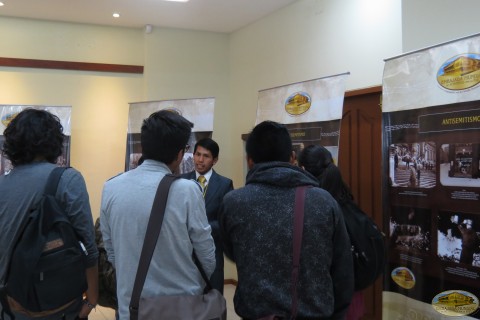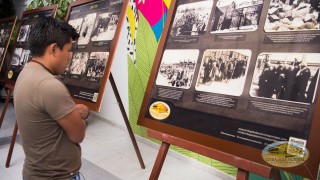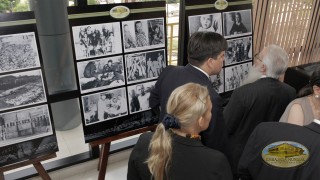Holocaust study program seeks to prevent future genocides: Educating to Remember in Bolivia
 Based on the study of the Holocaust for training in human rights the 1st University Forum of the Educating to Remember program was developed in Bolivia, with the purpose of transmitting the universal teachings of this historical event to identify the warning signs and the propensity for similar acts nowadays.
Based on the study of the Holocaust for training in human rights the 1st University Forum of the Educating to Remember program was developed in Bolivia, with the purpose of transmitting the universal teachings of this historical event to identify the warning signs and the propensity for similar acts nowadays.
With the theme: The Holocaust, paradigm of genocide, the Forum was held at the University of San Francisco de Asís (USFA), in La Paz, which included a photographic exhibition of the Shoah, on exhibition for three days.
This educational initiative of the Global Embassy of Peace Activists (GEAP) allows students to learn about the consequences of intolerance, hatred, discrimination and disrespect for life; in this way, prepares them to recognize the emergence of extremist governments, groups or individuals who carry out these actions.
About 350 university students from the USFA, teachers, administrative staff and academic authorities visited the photo gallery, and 180 students from the Faculty of Humanities attended the Forum.
 The rector of the University, Boris Crespo Toranzo, said:
The rector of the University, Boris Crespo Toranzo, said:
"Reflecting on our history and projecting our here and now, from our desires is the future; it is here in the mind, it is in the heart, it is in action, it is in human behavior. Let us live our days so that Auschwitz never happens again."
The presentations were made by specialists in International and Constitutional Law, who dimensioned the events of the Holocaust and made mention of other genocides; the Commission on Human Rights of the Chamber of Deputies and the Commission for Plural Justice of the Senate also had representation in the presentations.
 The Forum promotes the reorientation of the fundamental values and principles of human beings such as love of neighbor, respect for human dignity, equity, tolerance and solidarity.
The Forum promotes the reorientation of the fundamental values and principles of human beings such as love of neighbor, respect for human dignity, equity, tolerance and solidarity.
Human rights: defense tool
Joao Limachi Rosas, lecturer in Public and Private International Law of the Public University of El Alto (UPEA) spoke about the Holocaust and human rights.
He emphasized the impact and change on the idea of these fundamental rights after the genocidal barbarism, pointed out two important aspects: the internationalization of human rights and the development of International Humanitarian Right.
"No one is born genocidal, it is necessary to create a culture of human rights to prevent further episodes of genocide. The only tool to defend ourselves from those who exercise power is human rights,” was the final reflection of Professor Limachi.
The historical part of the Shoah was developed by Ramiro Llanos Moscoso, lecturer of the Criminology career at the Public University of El Alto (UPEA); in his presentation presented the statistics of those who died during World War II.
He also urged the young people to give new perspectives to the country, he said:
"Make your pretensions become rights and guarantee an adequate coexistence for our country."
For his part, Rodolfo Flores, a professor of Constitutional Right at the USFA, who also advises the Human Rights Commission of the Chamber of Deputies and adviser to the Senate Plural Justice Commission, emphasized the need to sensitize society in the issue of human rights and genocide.
He said: "A structure, a system of norms, is not enough because education is lacking, more sensitization in these subjects; this kind of activities, we as civil society, we should ask to be on the agenda of those who make decisions."
 Living teachings for humanity
Living teachings for humanity
The University Forums are currently being carried out in different countries of Latin America, reminding the history of the Holocaust and other crimes against humanity to teach their lessons as references in the present, in order to form a culture of respect for human dignity, rights And fundamental freedoms.
Educating to Remember also promotes a law project to include "The Holocaust, paradigm of genocide" as a topic of study, reflection and debate in education programs that are taught in educational centers of an official and private nature, at different levels. (See program)
See: Educational Conception on the Holocaust promotes the defense and practice of human rights.


